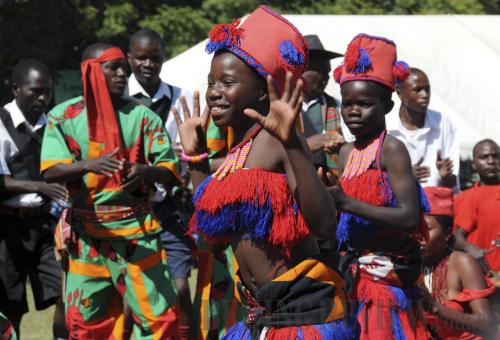|
 |
|
FUTURE MOVES: Africa's youth still need more access to services decades after the end of colonialism |
Africa is rich and its stock is rising, stated former United Nations Secretary General Kofi Annan. More than five decades after political liberation from colonialism, the fundamental civil and political human rights enshrined in constitutions have carved out political spaces for the continent's population and its future - the youth. Africa's youth - defined as between the ages of 15 to 24 years old - currently comprise 65 percent of the continent's overall population.
"Political liberation in Africa and Kenya has resulted in several important developments. During the pre-liberalized era of dictatorial rule, military rule, wars and conflicts, there was a strong control on what one could say and how one could say it," said Dr. Attiya Waris, a specialist in human rights and democratization in Africa.
"There is a famous case in Kenya where a man speaking in a bar was charged with treason for saying 'Moi must go!' However, if one were to say the same of any current president it is unlikely to have the same result. The youth as a result feel they can speak out on issues and not get beaten up, killed, jailed or even disappear," she said.
These rights are further articulated in the African Union (AU) Youth Charter, defined as: obligation of state parties, non-discrimination, freedom of movement, freedom of expression, freedom of thought, freedom of religion, protection of private life, protection of the family, the right to own and inherit property, the right of political, social, economic and cultural development; youth participation in all spheres of society, education and skills development, poverty eradication and socio-economic integration of youth, and sustainable livelihood and youth employment amongst other articles.
State services lacking
However, as Waris pointed out, the effectiveness and implementation of their ideas remain muffled. "Whether one looks at any social or other institutions, formal or informal, there is little sign of grooming of the youth to take over or even the application of good youth based ideas being tested or given space on the discussion table," she said.
This may be because an estimated 70 percent of African youth reside in rural areas, entering the job market early on and constituting 36.9 percent of the working population. In Sub-Saharan Africa, the participation rate is 30 percent (made up of five-14 years old). Yet while it greatly benefits families in the short run, "child labor elicits a cost in terms of foregone education and persistence of long-term poverty," revealed the World Bank's African Development Indicator report.
"The share of unemployed youth among the total unemployed can be as high as 83 percent in Uganda, 68 percent in Zimbabwe, and 56 percent in Burkina Faso. Unemployment among youth is often higher than among adults."
But though monetary poverty afflicts 70 percent of youth in Sub-Saharan Africa including Zambia (86 percent), Burundi (85 percent), Nigeria (92 percent), Mozambique (75 percent) and Uganda (93 percent), as the Bank concedes, it is not monetary poverty - the lack of available cash, that remains the root cause so much as the lack of state services facilitating the type of development required to increase the value of human resources.
Furthermore, an Oxfam report released in 2007 titled "Africa's Mission Billions" said, while conflict drains $18 billion from the continent annually, "it is becoming increasingly recognized that non-economic aspects of poverty, such as the absence or inadequacy of essential services, the lack of livelihood and educational opportunities, and the non-participation of youth in decisionand policy-making are conditions that promote the involvement of young people in conflict."
In fact, many countries possess significant domestic resources, including state revenue, and crucially, the foundation for domestic taxable industries capable of generating both employment and financing significant portions of the state budget.
|